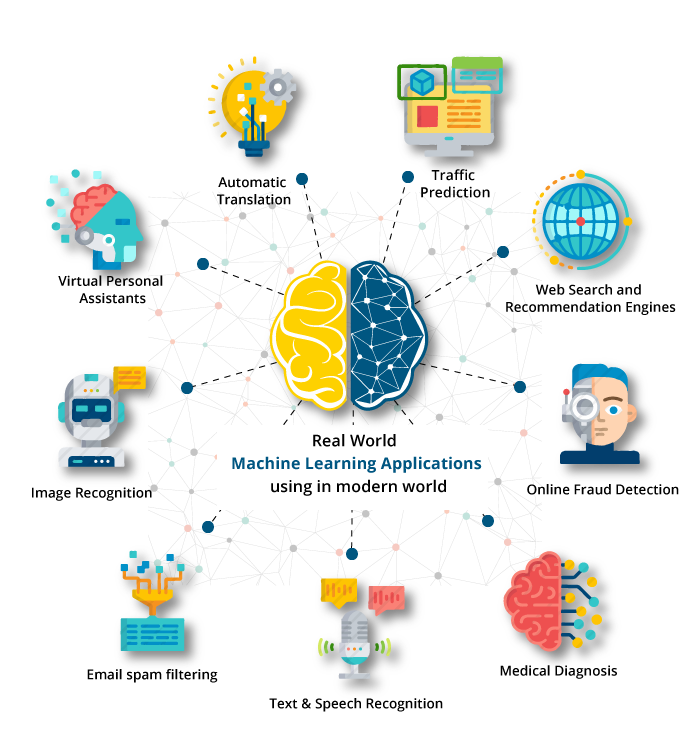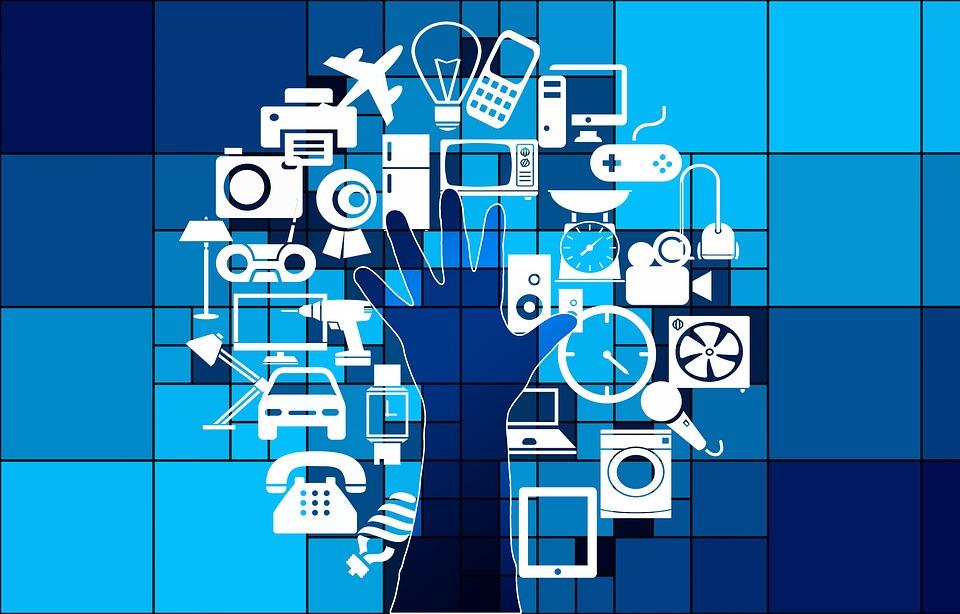INTRODUCTION
You all must have searched for something to purchase or something for education or health purposes, and then you get the same thing on your social media feed or on the web when you are net surfing. You get it RIGHT! So, have you ever imagined how it’s possible? It is possible because of machine learning. ML is upgrading the mobile app development process in all new aspects.
In traditional app development, developers typically develop apps with predefined rules and logic. Which restricts their ability to adapt to individual user preferences. However, with ML, apps are learning from user interactions. This enables developers to improve their app’s performance and user experience. With its predictive analysis features, machine learning is helping industries such as healthcare, finance, and e-commerce enhance the user experience with personalized recommendations.
Additionally, ML can help streamline the mobile app development process by time-consuming and automating tedious tasks such as testing and debugging. Thus, developers can focus on more complex and innovative aspects of the app. As a result, it fastens the development cycles of mobile app development companies.
So, here we will discuss the entire concept of machine learning. Furthermore, we will also give tips that you can apply ML in your mobile app development process along with that we’ll discuss its benefits, frameworks, and app’s functions.
MACHINE LEARNING: CATEGORIES AND MEANING
Machine learning is an application of artificial intelligence. It allows software to automatically discover, investigate, and imagine outcomes without the need for human involvement. Machine learning has been used in a variety of industries, and it is presently essential to the mobile app development process. In other words, it is a process by which computers are taught to perform tasks based on examples and patterns, rather than being programmed with specific instructions.
There are several categories of machine learning, including:
● Supervised Learning: This technique trains algorithms to correctly classify data or predict outcomes using data sets with labels. The weights are changed as more data is added to the model until the model is properly matched. This occurs as a result of the cross-validation procedure, which ensures that the model is neither over fit nor under fit. Organizations can use supervised learning to efficiently address a variety of real-world issues, such as email account spam categorization.
● Unsupervised Learning: This approach employs to analyze and group unlabeled datasets. Due to its capacity to identify patterns and similarities in data, it is perfect for cross-selling tactics, client segmentation, picture and pattern recognition, and exploratory data analysis. Some of the techniques used in this type of learning include Gaussian mixture models, hierarchical grouping, k-means, hidden Markov models, and others. These algorithms find hidden patterns or data groupings without the need for human involvement.
● Reinforcement Learning: Reinforcement Similar to supervised learning but without using sample data to teach the algorithm. The best strategy or policy for a specific situation will be determined by a string of successful outcomes. Some real-world examples of this would be teaching new rules or policies to robots by having them view videos rather than programming them into their software.
TOP MACHINE LEARNING FRAMEWORK
● CORE MACHINE LEARNING BY APPLE
● TENSORFLOW BY GOOGLE
● AMAZON ML SERVICES
● MS COGNITIVE SERVICES
● CONVOLUTIONAL ARCHITECTURE FOR FAST FEATURE EMBEDDING (CAFFE)
● PYTorch
● KERAS
● SCIKIT-LEARN
● MX-NET
● THEANO
● TORCH
MACHINE LEARNING TIPS TO UPGRADE MOBILE APP DEVELOPMENT PROCESS
As being a developer or running a mobile app development company. You can consider these tips to apply it to your Machine Learning project.
1. Identify the use cases:
The first step in upgrading mobile app development with machine learning is to identify the use cases where machine learning can be applied to improve the app’s performance, user experience, and functionality.
2. Choose the right machine learning framework:
There are several machine learning frameworks available, and choosing the right one depends on the app’s requirements, the size of the dataset, and the hardware resources available.
3. Use pre-trained models:
Pre-trained models can save development time and effort, especially when it comes to computer vision or natural language processing tasks.
Collect and preprocess data:
The quality of machine learning models depends on the data they are taught on. Therefore, it’s crucial to collect and preprocess the data to ensure it’s clean, accurate, and relevant.
4. Implement real-time predictions:
Machine learning can be used to make real-time predictions and decisions in the app, improving the user experience and increasing engagement.
Monitor and evaluate the model’s performance:
It’s important to monitor the machine learning model’s performance over time to ensure it’s still accurate and relevant. Regular reviews can assist in identifying the model’s defects.
5. Plan for scalability:
As the app grows, so does the data, and the machine learning model’s performance requirements. Therefore, it’s essential to prepare for scalability and make sure that the system is capable of handling the rising demand.
HOW MACHINE LEARNING UPGRADING APP’S FUNCTIONS
Machine learning is upgrading an app’s functions in various ways. Here are some of the ways you can use machine learning in the mobile app development process to enhance an app’s capabilities:

1. Predictive Analytics:
Predictive Analytics: Machine learning can be used to analyze user data and predict their behavior, preferences, and needs. This can help in personalizing the app experience and suggesting relevant content.
2. Image and Speech Recognition:
Machine learning algorithms can be trained to recognize images and speech, which can be used to enhance the functionality of an app. For example, reverse image search uses image recognition to identify objects in a picture.
3. Natural Language Processing (NLP):
In chatbots and voice assistants, developers use machine learning to evaluate and comprehend natural language. NLP is used to understand user queries and respond with relevant information.
4. Fraud Detection:
Fraudulent activity can be identified using machine learning, and it can be stopped before it starts. For example, developers are using machine learning algorithms to analyze user behavior and identify unusual patterns that may indicate fraud.
5. Recommendation Engines:
One can use Machine learning to suggest relevant products or content to users based on their previous behavior and interests. This increases user retention and interest. You can also use Machine to analyze and handle large amounts of data, resulting in more accurate and personalized app experiences for users.
POPULAR APPS THAT ARE USING MACHINE LEARNING
There are many popular apps that are using machine learning to enhance their features and functionalities. Here are some examples:
● Netflix – Based on their viewing habits, Netflix employs machine learning to suggest tailored content to users.
● Siri – Apple’s virtual assistant Siri uses ML to understand and respond to user commands.
● Uber – Uber uses machine learning to predict rider demand, optimize routes, and estimate arrival times..
● LinkedIn – In order to match job seekers with relevant job postings based on their qualifications and experience, LinkedIn employs machine learning.
● Amazon – Amazon employs machine learning to suggest products to users based on their browsing and purchasing history.
These are just a few examples of popular apps that are leveraging machine learning to improve user experiences and deliver more personalized services.
CONCLUSION
Machine Learning is all set to create a huge change in the area of mobile app development process. So, after reading the concepts of ML, are you ready to include machine learning in your mobile app development company? If yes, then don’t wait and step into the world of innovations.As significantly enhance the overall user experience and streamline the development process. By utilizing ML algorithms, you can optimize app performance, improve personalization, and reduce time spent on tedious tasks. Additionally, ML can aid in identifying and resolving bugs, reducing the likelihood of crashes and enhancing overall app stability.
Adding ML to the development process can also result in substantial cost reductions and improve productivity. As a result, developers who adopt this technology will have a competitive advantage in the rapidly changing mobile app industry.








